‘Have you been flossing regularly?’ is often a question that we are all greeted with as we step foot into a dental appointment. For a lot of us, the answer is ‘sometimes’ when what we really mean to say is no. If you aren’t already, here are some reasons you should consider adding flossing to your daily routine now:
1. Flossing prevents tartar build up and protects your gums
Brushing helps remove plaque (a soft sticky film of bacteria, food and minerals from saliva) mechanically by cleaning most surfaces of teeth. Brushing alone however does not adequately remove enough plaque for optimal oral health missing more than 20% of tooth surfaces (between teeth and under the gums). If plaque is not removed well enough or regularly enough it hardens (calcifies) resulting in build-up (calculus/tartar) which your dental professional can only remove using specific instruments at your regular dental hygiene appointment. Calculus build up can increase the risk of oral health problems like gingivitis (inflammation of the gums), periodontitis (bone loss around teeth), cavities (holes) in teeth and halitosis (bad breath).
In addition to brushing twice a day, flossing at least once a day can increase your effective plaque removal.
If you are wondering what calculus/tartar is and its effect on oral health (gingivitis and periodontitis) please click this link.
2. Flossing helps prevent diseases
Recent studies are showing a great deal of relationship between oral health and its impact on other parts of the body – systemic health. Poor oral health can increase the risk of heart disease, diabetes, respiratory diseases and in pregnant women it increases the risk of premature and low birth weight babies. Good oral hygiene habits therefore are not only good for the mouth but for overall health.
One of the most common responses we get from people when we ask why they don’t floss is- ‘I started flossing but it made my gums bleed so I stopped!’
It’s important to know that it’s normal for your gums to bleed a little at first when you start flossing. Your gums will be inflamed from the undisturbed plaque and like an inflamed cut on your arm, when bumped it will bleed a little bit. If you continue to floss correctly on regular basis the bleeding should reduce. If it doesn’t, you may need a professional cleaning to remove some of the harder build up or a few tips on your flossing technique (yes! There is a right way to floss).
You can also read a previous post on prevention of gum disease here: After your teeth cleaning
3. Flossing is an important part of ‘Preventative Care’ (it can even save you money!)
Emergency visits and extensive dental treatment over a lifetime can cost much more than regular preventative dental appointments. If you regularly attend the dentist from an early age good habits are more likely to be established. Routine appointments also allow your dental professional to closely monitor any changes and intercede at an early stage, hopefully minimizing any restorative work (fillings, crowns etc.)
This can all be avoided or reduced by the simple, effective removal of plaque – the first and most important step to achieving optimal oral health.
TIP:
Flossing can be hard to get used to and the correct way of flossing is important.
Ask your dental professional to show you how to floss at your next dental visit. At first it will be fiddly but practicing will help get your technique right.
Although we are meant to floss every night, at first you can start with one to two nights per week and then gradually build up to every night.
There are also other cleaning aids which may be used in addition flossing. Your hygienist/ dentist can assess this, and let you know about the products during your routine dental examination and hygiene appointment.
